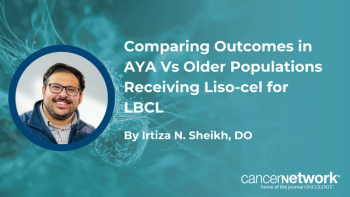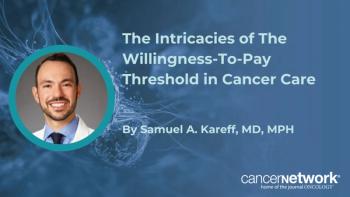
- ONCOLOGY Vol 11 No 10
- Volume 11
- Issue 10
Possible New Approach to Brain Tumors in AIDS Patients
Researchers may be close to developing an additional weapon for treating a type of rapidly growing, fatal brain tumor that
Researchers may be close to developing an additional weapon for treating a type of rapidly growing, fatal brain tumor that often afflicts AIDS patients.
The new approach, reported in a recent issue of the journal Blood, focuses on activating a protein receptor that stimulates cells to undergo apoptosis.
These specific tumorsprimary central nervous system (CNS) lymphomashave now been shown by the researchers to express the FAS receptor and to undergo cell death when that receptor is triggered.
Since the brain itself does not appear to express this receptor, researchers may be able to trigger the receptor on the tumor cells without damaging nearby normal brain tissue.
These brain tumors almost always contain Epstein-Barr virus, held at bay by healthy T-cells. But when the immune system is damaged, or the number of T-cells has dropped substantially, the virus activates, presumably leading to the brain lymphoma.
Robert Baiocchi, and Michael Caligiuri, co-director of the division of hematology and oncology and associate director for clinical cancer research at Ohio State University, examined tissue taken from eight different AIDS patients who had died from these lymphomas. They discovered that all the tumors expressed FAS at very high levels.
The brain is a chemotherapy sanctuary. We may be able to administer anti-FAS medicines within the brain that could stimulate the brain tumors to self-destruct, without harming normal brain or without traveling to other parts of the body that normally produce FAS, Caligiuri said.
To test their ideas, Caligiuri and Baiocchi turned to severe combined immune deficient mice. The researchers were then able to use anti-FAS compounds to trigger FAS which begin killing the human tumor that had developed in the mice.
Baiocchi and Caligiuri next examined three fresh brain tumors from patients with AIDS and primary CNS lymphoma and were also able to show that when the tumors received anti-FAS therapy, those tumor cells died. Furthermore, the cell death begun by the anti-FAS treatment was improved with radiation. The researchers saw improved tumor cell death when interleukin-2 was used.
The next step, Caligiuri said, is to grow these same tumors in the brains of rats that have deficient immune systems, and then test whether the animals blood-brain barriers isolate the treatment and protect the animals other organs.
Articles in this issue
over 28 years ago
Vinorelbine in Non-Small-Cell Lung Cancerover 28 years ago
Paclitaxel and Vinorelbine in Non-Small-Cell Lung Cancerover 28 years ago
Safety Data From North American Trials of Vinorelbineover 28 years ago
Cisplatin Alone vs Cisplatin Plus Vinorelbine in Stage IV NSCLCover 28 years ago
Current Management of Unresectable Non-Small-Cell Lung Cancerover 28 years ago
The Economics of Prostate Cancer ScreeningNewsletter
Stay up to date on recent advances in the multidisciplinary approach to cancer.













































